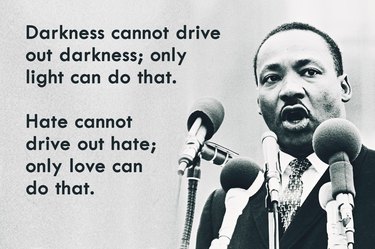Martin Luther King, Jr. Day is a federal holiday observed on the third Monday in January each year, near King's birthday (January 15). While many mentions of it are followed by phrases like "Mega Sale!!!!" and "Woo hoo, no work today," it's perhaps a better opportunity to remember and celebrate the life and work of one of America's greatest leaders. Below are a few suggestions for how to honor King on or around this day.
Video of the Day
Learn About Martin Luther King, Jr.’s Life
Dr. Martin Luther King, Jr. was the leader of the American Civil Rights movement from 1955 until his assassination in 1968. A Baptist minister and cofounder of the Southern Christian Leadership Conference, King was a proponent of nonviolent civil disobedience—the practice of peaceful resistance to unjust laws and power structures—in the pursuit of racial desegregation and equality. His political philosophy was deeply rooted in Christian values, though his humanist message is generally considered universal.
Video of the Day
Dr. King led many now-legendary protests, marches, and rallies, including the Montgomery Bus Boycott, which followed Rosa Parks's famed act of civil disobedience and subsequent arrest; the Selma marches in support of voting rights, which led to the signing of the Voting Rights Act in 1965; and the March on Washington in 1963, where King delivered his famous "I Have a Dream" speech. His work, which brought him a Nobel Prize in in 1964, led to unprecedented gains in African-American civil rights, including the passage, a few days after his death, of the Civil Rights Act of 1968.
King was assassinated on April 4, 1968, at the age of 39, at the Lorraine Motel in Memphis, Tennessee. He is remembered as one of the world's greatest moral and political leaders and a hero to social justice activists, politicians, and people of all races, creeds, and nationalities.
To learn more about Dr. King, check out the King Center, which has biographical information as well as an extensive archive of documents relating to his life and work.
Martin Luther King Speeches and Writings
You've no doubt heard some of Martin Luther King, Jr.'s most famous quotes; why not check out a few of the full transcripts? King's speeches and sermons give a great sense of his powerful intellect, profound spirituality, and enduring political philosophy. Here are just a few:
Perhaps his most famous and oft-quoted speech, "I Have a Dream" was King's address from the steps of the Lincoln Memorial during the March on Washington in 1963. In it, he lays out his vision for a society free from racial injustice.
Written by King while he was incarcerated in a Birmingham, Alabama jail cell for ignoring an injunction against public protest or demonstration, this open letter to the leaders and members of that community beautifully describes the philosophy and moral imperative of nonviolent protest.
King gave this speech on the steps of the Alabama state capitol after having completed Selma to Montgomery March in 1965, a story captured in the film Selma.
This was the last speech that King gave, just one day before his assassination. Some have found an eerie prescience in his words that day, as he referenced Moses's journey in the Bible: "I may not get there with you. But I want you to know tonight, that we, as a people, will get to the Promised Land. So I'm happy, tonight. I'm not worried about anything. I'm not fearing any man."
King was awarded the 1964 Nobel Peace Prize, making him, at 35, the youngest recipient to date. He donated his prize money to the cause of Civil Rights.
Delivered at Dexter Avenue Baptist Church in Montgomery, Alabama, in 1957, this sermon explores the power of love to overcome hatred, enmity, and violence.
Embrace Dr. King’s Principles and Values
Not to be "that guy," but we're pretty sure Dr. King would say that the best way to honor him on this day (and all days) is to live a life guided by his words and ideals.
Martin Luther King, Jr. spoke about love's power to overcome hatred and injustice: "Hate cannot drive out hate; only love can do that." He had "an audacious faith in the future of mankind" and held that "the arc of the moral universe is long, but it bends toward justice." He believed that "injustice anywhere is a threat to justice everywhere"—that we are all morally interconnected—and that "the ultimate measure of a man is not where he stands in moments of comfort and convenience, but where he stands at times of challenge and controversy."
King drew strength and inspiration from his faith, from the work of civil disobedience and nonviolence proponents such as Thoreau and Gandhi, and from the ideals that underpin the Declaration of Independence, the Constitution, and American values: The certainty that all are created equal, that all are entitled to the same basic rights, and that it is our moral and civic duty to ensure and protect those rights for everyone.
"In the end," he advised, "we will remember not the words of our enemies, but the silence of our friends."
